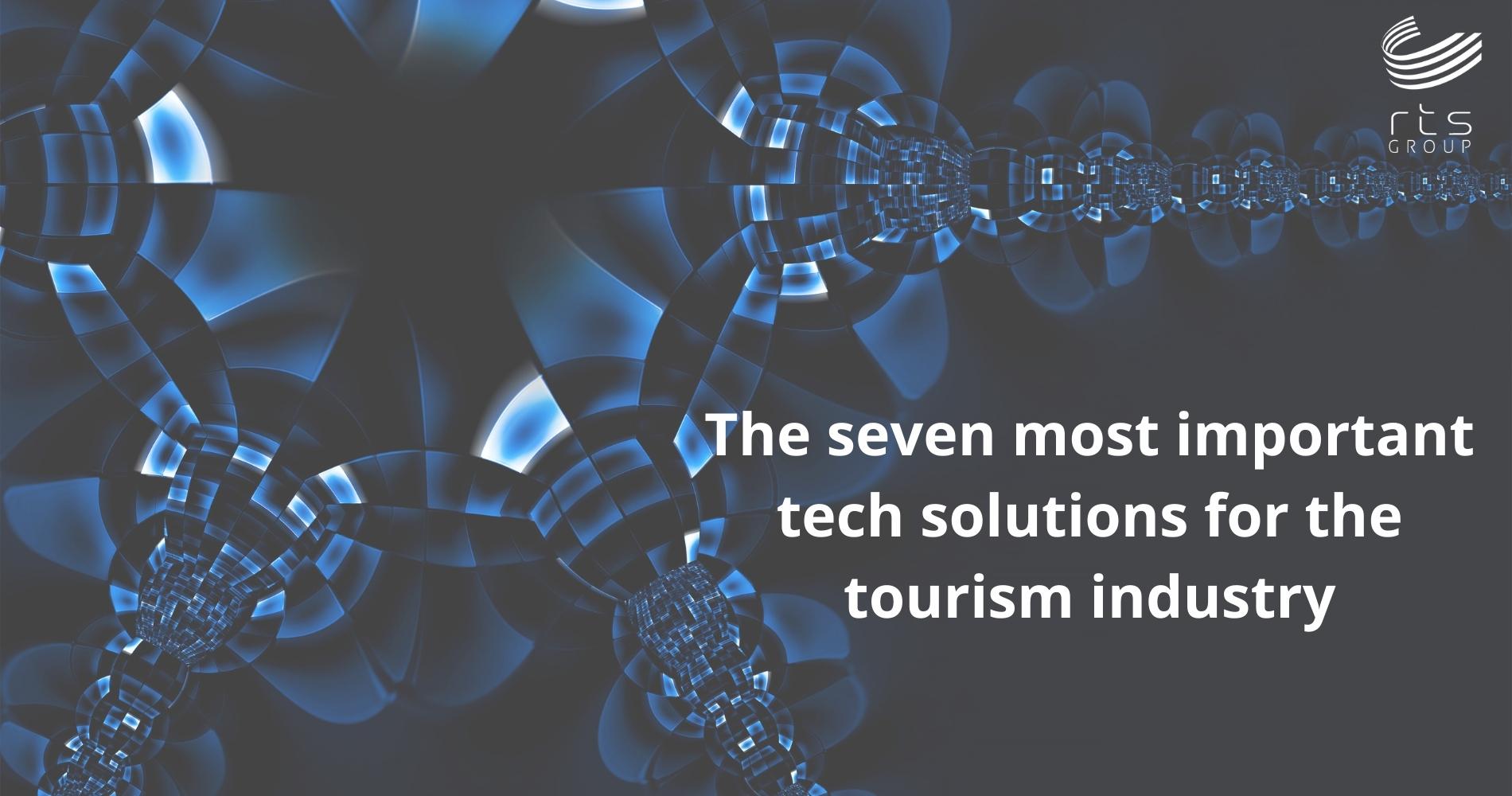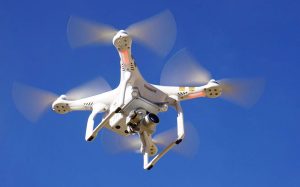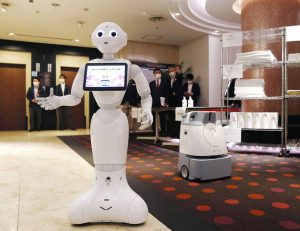
The seven most important tech solutions for the tourism industry.
In the present day, there is no doubt that travel and technology go hand in hand. New tech solutions, such as virtual reality, artificial intelligence, blockchain digital assistants, big data, drones and robotics could transform the way in which businesses in the tourism industry operate.
In the present day, there is no doubt that travel and technology go hand in hand. All over the world, travel agencies, hotels, museums and attractions offer a new range of services to visitors. The tourism industry has seen some major changes over the past few years. I find working in the travel industry an exciting one. The rise of the sharing economy, the increase in bookings done over mobile devices, and the blurring of the lines between leisure and business travel have all played a role in making it a very exciting industry to work for.
New tech solutions, such as virtual reality, artificial intelligence, blockchain and robotics, could transform the way in which businesses in the tourism industry operate. Here are seven of the most exciting innovations that have the potential to change the tourism industry forever.
- Virtual reality
 Virtual reality (VR) has become a buzzword for the travel industry. The innovative technology that is being developed by this company has the ability to change virtually every aspect of the travel experience. As an example, VR could be used to help travelers get a realistic view of a hotel, resort or attraction before making a decision whether to stay at it or not. They have the possibility of exploring potential destinations for holidays before making an actual booking could be useful to travelers. By doing so, tourists would be able to make more informed decisions about their travel plans.
Virtual reality (VR) has become a buzzword for the travel industry. The innovative technology that is being developed by this company has the ability to change virtually every aspect of the travel experience. As an example, VR could be used to help travelers get a realistic view of a hotel, resort or attraction before making a decision whether to stay at it or not. They have the possibility of exploring potential destinations for holidays before making an actual booking could be useful to travelers. By doing so, tourists would be able to make more informed decisions about their travel plans.
Marriott Hotels has been one of the earliest adopters of virtual reality. The hospitality giant launched its VR Postcards app way back in 2016. The app allows guests to view VR videos of cities and attractions that are close to where the hotel is situated.
Marriott is also experimenting with using virtual reality in order to help its employees train for situations like evacuations, and also to prepare for such a situation. Elsewhere, Marriott’s rival Hilton is experimenting with using VR to help its sales teams better sell the company’s extensive hotel portfolio. Travelport, the travel commerce platform, is also using VR to help travel sellers prepare for peak travel seasons.
- Artificial intelligence
 In the tourism industry, there is a lot of potential for artificial intelligence (AI) to make significant changes. Using artificial intelligence, travel companies are able to better predict the demand of travelers. Companies are able to better personalize their marketing campaigns by using artificial intelligence. Artificial intelligence can assist businesses to personalize the service they offer to customers. Moreover, it can help businesses to manage their supply chains in an efficient manner. By doing so, travel companies will be able to better manage the huge amounts of information they generate.
In the tourism industry, there is a lot of potential for artificial intelligence (AI) to make significant changes. Using artificial intelligence, travel companies are able to better predict the demand of travelers. Companies are able to better personalize their marketing campaigns by using artificial intelligence. Artificial intelligence can assist businesses to personalize the service they offer to customers. Moreover, it can help businesses to manage their supply chains in an efficient manner. By doing so, travel companies will be able to better manage the huge amounts of information they generate.
- Blockchain
 The blockchain technology, a distributed ledger system, could revolutionize the tourism industry. A blockchain-based system can help travel companies offer their customers a more personalized experience. The system can also help to ensure the privacy and security of customer data. As a result, blockchain technologies can help to establish trust between travel companies and their customers. This can be a fairly useful tool for creating transparency in a field that is often considered opaque.
The blockchain technology, a distributed ledger system, could revolutionize the tourism industry. A blockchain-based system can help travel companies offer their customers a more personalized experience. The system can also help to ensure the privacy and security of customer data. As a result, blockchain technologies can help to establish trust between travel companies and their customers. This can be a fairly useful tool for creating transparency in a field that is often considered opaque.
As an example, Winding Tree, a blockchain startup in the early stages, aims to help travelers buy and sell travel services in a more convenient and affordable manner. The Travel Marketplace built by Winding Tree was built on top of the Ethereum blockchain.
- Digital assistants

The tourism industry has the potential to be transformed by the introduction of digital assistants of the likes of Alexa, Siri, and Cortana. Travelers can benefit from the use of digital assistants by making it easier for them to plan their trips. Additionally, digital assistants can be used to learn more about the destinations they are planning to visit.
Assisting tourists to find travel services could be provided by digital assistants. Tourism is one of the most exciting sectors of the world, and digital assistants can also be used to help tourists to book travel services. Online assistants can actually transform the customer experience. There is no doubt that new technologies will play a crucial role in enhancing how companies serve customers in the future, with the sector continuing to grow and evolve.
- Big Data
 Despite the recent hype over Big Data, the industry still hasn't shown all the potential it offers for the traveling industry, even though many of its benefits have already been touted. In spite of this, several industry players have already adopted it.
Despite the recent hype over Big Data, the industry still hasn't shown all the potential it offers for the traveling industry, even though many of its benefits have already been touted. In spite of this, several industry players have already adopted it.
Meliá uses the information that they have on their guests to help them determine what is the best target for a marketing campaign. A primary objective of this company is to analyze the data in their database and to look at the amount spent, the purpose of the trip, the country from which the customer originated and cross-check this information with government data in order to come up with the most appropriate customer profile for achieving a higher success rate. In such a way, they are able to improve the effectiveness of their campaigns. They also optimize the investment needed for these campaigns as they are able to segment even better.
- Drones
 Drones could transform the tourism industry.For example, drones could be used as tour guides. They could showcase tourist attractions. Drones could transport tourists to hard-to-reach locations. Drones could be used to deliver food to guests at hotels. The rise of drones will also be good news for the tourism industry’s security teams. Drones could be used to keep watch on tourist hotspots. They could also be used to patrol beach fronts, buildings, airports, ports and other sites of mass tourism.
Drones could transform the tourism industry.For example, drones could be used as tour guides. They could showcase tourist attractions. Drones could transport tourists to hard-to-reach locations. Drones could be used to deliver food to guests at hotels. The rise of drones will also be good news for the tourism industry’s security teams. Drones could be used to keep watch on tourist hotspots. They could also be used to patrol beach fronts, buildings, airports, ports and other sites of mass tourism.
- Robotics
 Robotics has the potential to transform the tourism industry. Artificially intelligent robotic assistants, such as those from hotels like Hilton, have been making a huge impact on how people access information, with many of them equipped with speech recognition technology.
Robotics has the potential to transform the tourism industry. Artificially intelligent robotic assistants, such as those from hotels like Hilton, have been making a huge impact on how people access information, with many of them equipped with speech recognition technology.
This technology can be used to transport passengers on transportation. Using them is useful during airport security screenings for detecting weapons, and some manufacturers are also employing robotics in order to create luggage cases that can follow you, intelligently. In addition to this, travel agents are using robots to pre-screen customers, allowing customers to wait for flights at a more productive time. As more and more robot assistants become artificially intelligent, as well as equipped with speech recognition technology, how people access information has changed drastically. In addition to the above, robots are also used for many other purposes.
